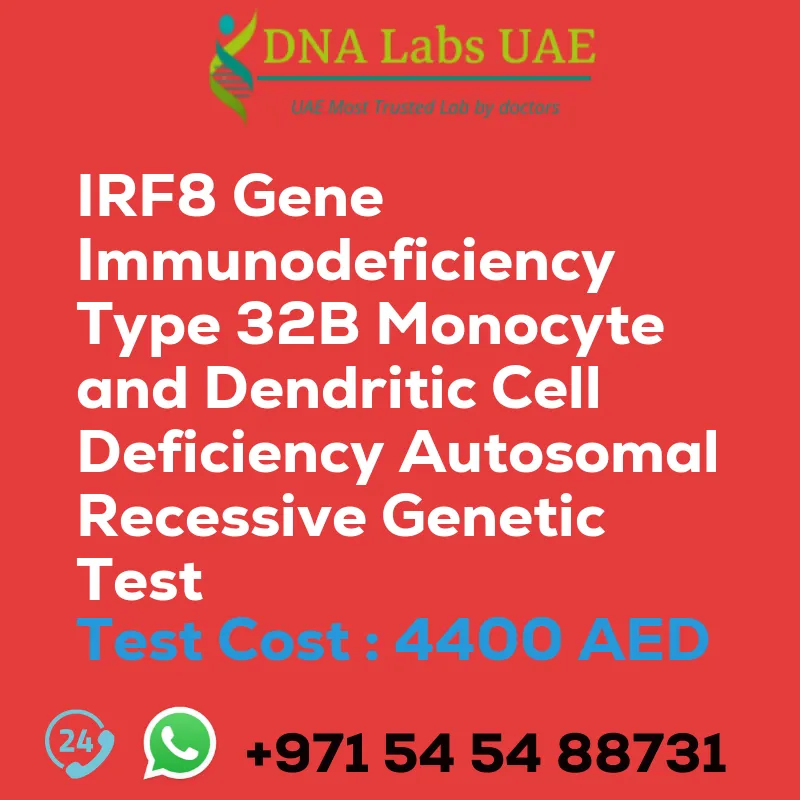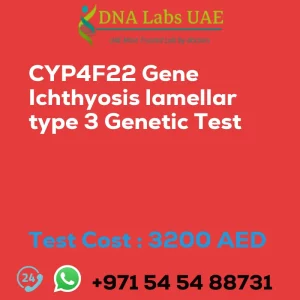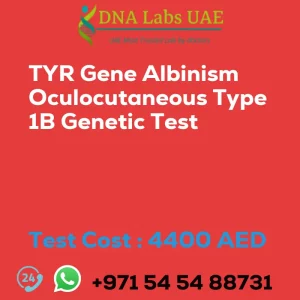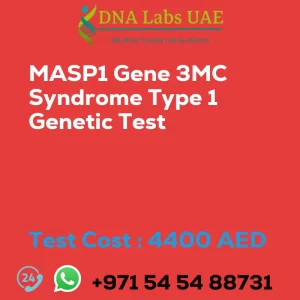IRF8 Gene Immunodeficiency Type 32B Monocyte and Dendritic Cell Deficiency Autosomal Recessive Genetic Test
At DNA Labs UAE, we offer the IRF8 Gene Immunodeficiency type 32B monocyte and dendritic cell deficiency autosomal recessive genetic test. This test helps in diagnosing a rare genetic disorder characterized by a deficiency of monocytes and dendritic cells, which are important components of the immune system.
Test Components
The test includes the following components:
- IRF8 Gene Immunodeficiency type 32B monocyte and dendritic cell deficiency autosomal recessive genetic test
Price
The cost of the test is 4400.0 AED.
Sample Condition
The test requires a blood sample, extracted DNA, or one drop of blood on an FTA card.
Report Delivery
The report will be delivered within 3 to 4 weeks.
Method
The test utilizes NGS (Next-Generation Sequencing) technology.
Test Type
The test is categorized under Osteology Dermatology Immunology Disorders.
Doctor
The test is recommended by dermatologists.
Test Department
The test is conducted by our Genetics department.
Pre Test Information
Prior to undergoing the IRF8 Gene Immunodeficiency type 32B monocyte and dendritic cell deficiency autosomal recessive genetic test, it is important to provide the clinical history of the patient. Additionally, a genetic counseling session may be conducted to draw a pedigree chart of family members affected by the condition.
Test Details
IRF8 gene immunodeficiency type 32B is a rare genetic disorder that is inherited in an autosomal recessive manner. Both copies of the IRF8 gene must be mutated for the disease to manifest. To diagnose this condition, a next-generation sequencing (NGS) genetic test is performed. NGS allows for the simultaneous analysis of multiple genes, including the IRF8 gene. The test involves obtaining a DNA sample, typically through a blood sample, which is then sequenced using NGS technology. The sequencing data is analyzed to identify any mutations or variations in the IRF8 gene associated with the disease. The results of the test can confirm a diagnosis of IRF8 gene immunodeficiency type 32B and provide valuable information for understanding the underlying cause of the immunodeficiency and guiding treatment decisions.
It is important to note that genetic testing for IRF8 gene immunodeficiency type 32B should be performed by healthcare professionals with expertise in genetics. They can provide counseling and support throughout the testing process and help interpret the results based on the individual’s symptoms and medical history.
| Test Name | IRF8 Gene Immunodeficiency type 32B monocyte and dendritic cell deficiency autosomal recessive Genetic Test |
|---|---|
| Components | |
| Price | 4400.0 AED |
| Sample Condition | Blood or Extracted DNA or One drop Blood on FTA Card |
| Report Delivery | 3 to 4 Weeks |
| Method | NGS Technology |
| Test type | Osteology Dermatology Immunology Disorders |
| Doctor | Dermatologist |
| Test Department: | Genetics |
| Pre Test Information | Clinical History of Patient who is going for IRF8 Gene Immunodeficiency type 32B, monocyte and dendritic cell deficiency, autosomal recessive NGS Genetic DNA Test. A Genetic Counselling session to draw a pedigree chart of family members affected with IRF8 Gene Immunodeficiency type 32B, monocyte and dendritic cell deficiency, autosomal recessive NGS Genetic DNA Test gene IRF8 |
| Test Details |
IRF8 gene immunodeficiency type 32B is a rare genetic disorder characterized by a deficiency of monocytes and dendritic cells, which are important components of the immune system. This condition is inherited in an autosomal recessive manner, meaning that both copies of the IRF8 gene must be mutated for the disease to manifest. To diagnose IRF8 gene immunodeficiency type 32B, a next-generation sequencing (NGS) genetic test can be performed. NGS is a high-throughput sequencing method that allows for the simultaneous analysis of multiple genes, including the IRF8 gene. This test can identify mutations or variations in the IRF8 gene that are associated with the disease. The NGS genetic test for IRF8 gene immunodeficiency type 32B involves obtaining a DNA sample from the individual, typically through a blood sample. The DNA is then sequenced using NGS technology, which generates large amounts of sequencing data. This data is then analyzed to identify any mutations or variations in the IRF8 gene. The results of the NGS genetic test can confirm a diagnosis of IRF8 gene immunodeficiency type 32B if mutations or variations in the IRF8 gene are detected. This information can be useful for understanding the underlying cause of the immunodeficiency and guiding treatment decisions. It is important to note that genetic testing for IRF8 gene immunodeficiency type 32B is typically performed by healthcare professionals with expertise in genetics. They can provide counseling and support to individuals and families undergoing testing and help interpret the results in the context of the individual’s symptoms and medical history. |








